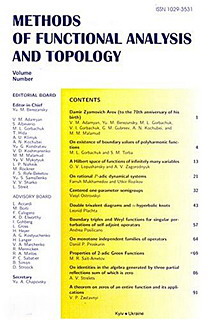Martin Friesen
Search this author in Google Scholar
Weak-coupling limit for ergodic environments
Martin Friesen, Yuri Kondratiev
MFAT 25 (2019), no. 2, 118-133
118-133
The main aim of this work is to establish an averaging principle for a wide class of interacting particle systems in the continuum. This principle is an important step in the analysis of Markov evolutions and is usually applied for the associated semigroups related to backward Kolmogorov equations, c.f. [27]. Our approach is based on the study of forward Kolmogorov equations (a.k.a. Fokker-Planck equations). We describe a system evolving as a Markov process on the space of finite configurations, whereas its rates depend on the actual state of another (equilibrium) process on the space of locally finite configurations. We will show that ergodicity of the environment process implies the averaging principle for the solutions of the coupled Fokker-Planck equations.
Evolution of states and mesoscopic scaling for two-component birth-and-death dynamics in continuum
Martin Friesen, Oleksandr Kutoviy
MFAT 22 (2016), no. 4, 346-374
346-374
Two coupled spatial birth-and-death Markov evolutions on $\mathbb{R}^d$ are obtained as unique weak solutions to the associated Fokker-Planck equations. Such solutions are constructed by its associated sequence of correlation functions satisfying the so-called Ruelle-bound. Using the general scheme of Vlasov scaling we are able to derive a system of non-linear, non-local mesoscopic equations describing the effective density of the particle system. The results are applied to several models of ecology and biology.
Non-autonomous interacting particle systems in continuum
MFAT 22 (2016), no. 3, 220-244
220-244
A conservative Feller evolution on continuous bounded functions is constructed from a weakly continuous, time-inhomogeneous transition function describing a pure jump process on a locally compact Polish space. The transition function is assumed to satisfy a Foster-Lyapunov type condition. The results are applied to interacting particle systems in continuum, in particular to general birth-and-death processes (including jumps). Particular examples such as the BDLP and Dieckmann-Law model are considered in the end.

